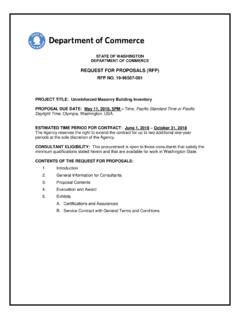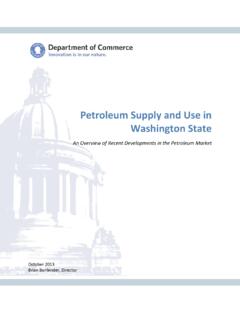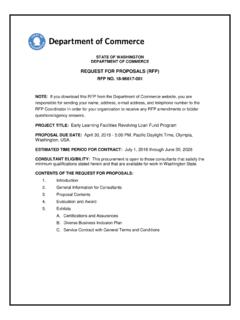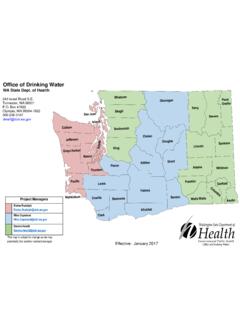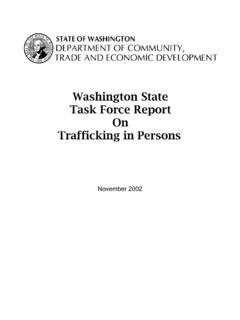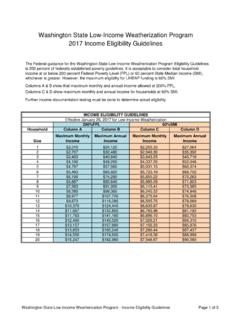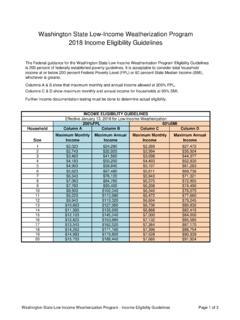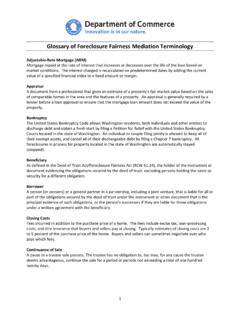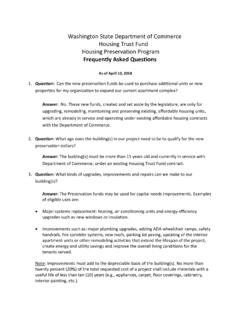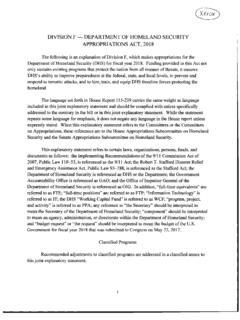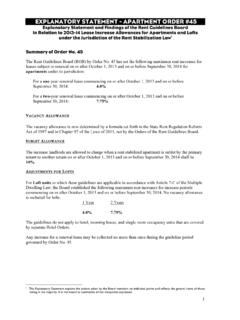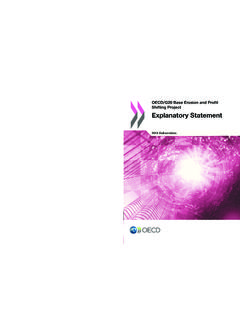Transcription of Concise Explanatory Statement and Response to …
1 Concise Explanatory Statement and Response to Comments Regarding Adoption of Rules for Practicable Use of Alternative Fuels and Vehicles by Local Governments New Chapter 194-29: Practicable Use of Electricity and Biofuels to Fuel Local Government Vehicles, Vessels and Construction Equipment October 17, 2016 Concise Explanatory Statement and Response to Comments 1 Introduction The Washington State Department of Commerce (Commerce) prepared this Concise Explanatory Statement and Response to Comments summary to meet requirements of the Washington State Administrative Procedures Act, the law that guides agency rule-making (RCW ). Section I provides a general description of the process and the scope of work on the proposed rules and the agency s reasons for adopting the proposed rules. Section II responds to the comments received regarding the proposed rules, indicating how the final rules reflect agency consideration of the comments.
2 Section III summarizes differences between the proposed and adopted rules. This document is available at: Section I: Concise Explanatory Statement Statutory Authority RCW requires the director of the Department of Commerce to adopt rules necessary to determine practicable goals for use of biofuels, electricity, natural gas and propane by local government subdivisions of the state that own and operate vessels, vehicles and construction equipment. Scope of the Rule The purpose of this rulemaking is to establish standards for practicability ( regional availability of fuels, vehicle costs, cost of program implementation, cost differentials in different parts of the state, differences between types of vehicles, vessels or equipment) for local government planning and compliance with RCW (2). Anticipated effects are clarification and guidance regarding procurement decisions for alternative fuels and vehicles, and annual reporting on compliance efforts to the legislature and the Governor s Office.
3 How Rules Were Developed As directed by RCW , rule development began in 2014 with establishment of an advisory committee comprised of organizations representing the various forms of local government and their members, including Association of Washington Cities, Washington State Association of Counties, Washington Public Utility District Association, Washington Public Ports Association, Office of the Superintendent of Public Instruction, Public Fleet Managers Association, Washington State Transit Association, Washington Fire Chiefs, and Washington Fire Commissioners Association, along with Puget Sound Energy representing electrical and natural gas utilities. Concise Explanatory Statement and Response to Comments 2 The advisory committee met seven times between September 2014 and March 2015. In addition, all local governments subject to annual reporting requirements under the proposed rules were notified of the rulemaking process and opportunity to comment.
4 Draft rules were initially filed June 3, 2015, and a public hearing held July 7, 2015. The draft was subsequently withdrawn to incorporate comments received during the final review period. Revised draft rules were filed May 31, 2016, and a public hearing held July 14, 2016. Throughout the rulemaking, written comments were invited to be submitted to: Peter Moulton, Senior Energy Policy Specialist PO Box 42525 Olympia, WA 98504-2525 The following phone and fax numbers, direct to Commerce staff, were provided to the public for questions or to submit comments: phone 360-725-3116, fax 360-586-0049, teletypewriter 360-586-0772. Other outreach and public involvement steps taken by Commerce include: Providing presentations at meetings of the Public Fleet Managers Association, Washington State Association of County Engineers, Washington Association of School Business Officials, Washington State Transit Association and others. Establishing an e-mail distribution list that kept interested parties updated on progress throughout the rule development process.
5 Establishing a project web site at: Initial Scoping Commerce filed a Preproposal Statement of Inquiry Form (CR-101) with the Office of the Code Reviser on August 4, 2014 to initiate the rulemaking process. This document is included below. Proposed Rules: Round One Commerce filed a Proposed Rulemaking Form (CR-102) with the Office of the Code Reviser on June 3, 2015. Written comments were accepted until July 10, 2015, and 14 letters were received. A public hearing was held July 7, 2015, commencing at 10am, in Olympia, Washington. Five people attended in person, and one via telephone. Only two attendees offered oral comments; the first recommended a price buffer when procuring biodiesel-blend fuels, the second recommended inclusion of renewable propane. Proposed Rules: Round Two Based upon the comments received, Commerce withdrew the draft rules for further consideration. Revised draft rules were filed May 31, 2016, and written comments accepted until July 15, 2016.
6 A public hearing was held July 14, 2016, with five people in attendance, three in person and two via telephone. One person offered two oral comments, the first Concise Explanatory Statement and Response to Comments 3 regarded procurement of biodiesel-blend fuels when the price is within one percent of conventional diesel fuel, and the second regarded transit agencies procurement of natural gas vehicles and use of renewable natural gas. No written comments were received. Comments regarding both versions of the proposed rules, and associated staff analysis, can be found at: Adopted Rules Commerce adopted and filed the final rule in October 2016 as 194-29 WAC. As required by the Washington State Administrative Procedures Act (RCW ), Commerce prepared this Concise Explanatory Statement and Response to Comments Summary to identify the reasons for adopting the rules, describe differences between the proposed and adopted rule, and respond to all comments received regarding the proposed rule, indicating how the final rule reflects agency consideration of the comments.
7 Concise Explanatory Statement and Response to Comments 4 Section II: Responsiveness Summary Commerce received 14 written letters, and three oral comments, on proposed rule language during the course of the two public review periods. Below is a summary of Commerce s Response to those comments. SCOPE OF RULEMAKING Comment: Allow local governments to establish their own purchasing policies guiding procurement of alternative fuels and vehicles, and determine availability of vehicles that meet their operational needs. Response : Commerce believes it is important to establish consistent minimum standards by which to assess compliance, and that allowing local governments to set independent procurement policies would negate the intent of the enabling legislation. Comment: Commerce has no authority to create law or unfunded mandates in reporting or procurement procedures. Delete any reporting requirements. Response : Commerce is required by RCW (2) to determine whether they [local government subdivisions] have meet the goals set forth in RCW (2).
8 Commerce cannot make such determinations without the minimum annual reporting requirements in WAC 194-19-080. Comment: RCW requires a complete change in fuel sources effective June 1, 2018, yet the proposed rule requires only that procurement of replacement assets begin on that date. Response : RCW requires the rules to address criteria for determining how the goal in RCW (2) will be met by June 1, 2018. Neither section of code requires a complete change in fuel source. RCW and (2) require only that the rules assess compliance to the extent determined practicable by the rules. Comment: The proposed rules do not effectively integrate requirements for purchase of vehicles and use of biofuels. An alternative approach is recommended that quantifies reduction based upon powertrain, anticipated usage, well-to-wheels greenhouse gas emissions, and other variables. Response : Commerce appreciates the extensive thought that went into preparing an alternative to the procurement section of the proposed rules, yet is concerned that other local governments will balk at the detailed analysis, reporting and associated costs necessary to track compliance.
9 Given the rapid rate at which various alternative fuel and vehicle technologies and markets are evolving, Commerce believes the rules as currently proposed will reasonably achieve the overarching goals of the enabling legislation. Concise Explanatory Statement and Response to Comments 5 Comment: Remove reference to vehicle conversion as there are no requirements under law to convert vehicles to other fuel usage, and there is conflicting state law specifically stating conversion is not required. Response : The proposed rules do not require vehicle conversion. Comment: The proposed rule doesn t allow procurement of a powertrain or fuel judged not to be practicable. Response : The proposed rules encompass all powertrain and fuel options currently available in the marketplace. Should new technologies become available that fall outside the definition of practicability, the rules can be modified at that time. Comment: Omit sections that prioritize electrification and biofuels in order to provide local governments with the broadest array of fuel choices.
10 Response : Per RCW (1), natural gas and propane may be substituted for electricity or biofuel if the Department of Commerce determines that electricity and biofuel are not reasonably available. Electricity and biofuels, under the conditions contained in these rules, are considered reasonably available. Therefore, the rules will retain the priorities specified in the enabling legislation. DEFINITIONS OF PRACTICABLE AND LIFECYCLE COST Comment: Reword compliance evaluation section to include reference to definitions of lifecycle cost and practicable as criteria local governments will use to make vehicle and purchasing decisions. Response : The need to reword this section is unclear. Practicable, the overarching intent of the rules, is defined primarily through an assessment of lifecycle cost. Definitions are provided for both terms. Comment: Commerce should provide adequate resources for determining lifecycle costs prior to implementation.
